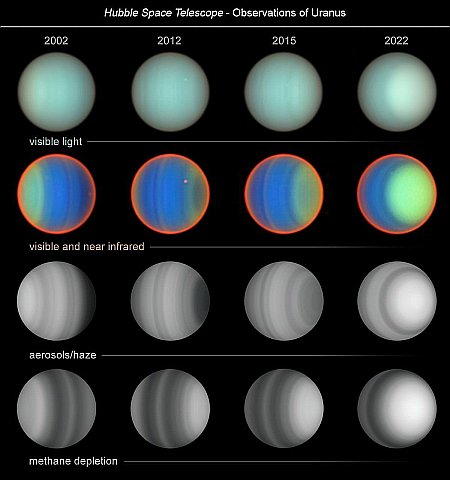Twenty years of Hubble data map one long season on Uranus
Astronomers using the Hubble Space Telescope multiple times since 2002 have now tracked the changes in its atmosphere during one quarter of its 84 year orbit around the Sun.
The image to the right, reduced and sharpened to post here, shows Hubble’s views across several electromagnetic wavelengths. Uranus’s rotational tilt or inclination is almost 90 degrees, so that it literally rolls on its side as it orbits the Sun. You can see this especially in the bottom two rows. From 2012 to 2022 one pole slowly shifted westward. From the press release:
The Hubble team observed Uranus four times in the 20-year period: in 2002, 2012, 2015, and 2022. They found that, unlike conditions on the gas giants Saturn and Jupiter, methane is not uniformly distributed across Uranus. Instead, it is strongly depleted near the poles. This depletion remained relatively constant over the two decades. However, the aerosol and haze structure changed dramatically, brightening significantly in the northern polar region as the planet approaches its northern summer solstice in 2030.
Since we have not yet observed Uranus over one full year, there are a lot of uncertainties in any conclusions the scientists propose. For one, we don’t know the general atmospheric patterns across all four seasons. For another, any changes seen now might simply be the planet’s weather, random events not directly related to long term climate patterns.
On Christmas Eve 1968 three Americans became the first humans to visit another world. What they did to celebrate was unexpected and profound, and will be remembered throughout all human history. Genesis: the Story of Apollo 8, Robert Zimmerman's classic history of humanity's first journey to another world, tells that story, and it is now available as both an ebook and an audiobook, both with a foreword by Valerie Anders and a new introduction by Robert Zimmerman.
The print edition can be purchased at Amazon or from any other book seller. If you want an autographed copy the price is $60 for the hardback and $45 for the paperback, plus $8 shipping for each. Go here for purchasing details. The ebook is available everywhere for $5.99 (before discount) at amazon, or direct from my ebook publisher, ebookit. If you buy it from ebookit you don't support the big tech companies and the author gets a bigger cut much sooner.
The audiobook is also available at all these vendors, and is also free with a 30-day trial membership to Audible.
"Not simply about one mission, [Genesis] is also the history of America's quest for the moon... Zimmerman has done a masterful job of tying disparate events together into a solid account of one of America's greatest human triumphs."--San Antonio Express-News
Astronomers using the Hubble Space Telescope multiple times since 2002 have now tracked the changes in its atmosphere during one quarter of its 84 year orbit around the Sun.
The image to the right, reduced and sharpened to post here, shows Hubble’s views across several electromagnetic wavelengths. Uranus’s rotational tilt or inclination is almost 90 degrees, so that it literally rolls on its side as it orbits the Sun. You can see this especially in the bottom two rows. From 2012 to 2022 one pole slowly shifted westward. From the press release:
The Hubble team observed Uranus four times in the 20-year period: in 2002, 2012, 2015, and 2022. They found that, unlike conditions on the gas giants Saturn and Jupiter, methane is not uniformly distributed across Uranus. Instead, it is strongly depleted near the poles. This depletion remained relatively constant over the two decades. However, the aerosol and haze structure changed dramatically, brightening significantly in the northern polar region as the planet approaches its northern summer solstice in 2030.
Since we have not yet observed Uranus over one full year, there are a lot of uncertainties in any conclusions the scientists propose. For one, we don’t know the general atmospheric patterns across all four seasons. For another, any changes seen now might simply be the planet’s weather, random events not directly related to long term climate patterns.
On Christmas Eve 1968 three Americans became the first humans to visit another world. What they did to celebrate was unexpected and profound, and will be remembered throughout all human history. Genesis: the Story of Apollo 8, Robert Zimmerman's classic history of humanity's first journey to another world, tells that story, and it is now available as both an ebook and an audiobook, both with a foreword by Valerie Anders and a new introduction by Robert Zimmerman.
The print edition can be purchased at Amazon or from any other book seller. If you want an autographed copy the price is $60 for the hardback and $45 for the paperback, plus $8 shipping for each. Go here for purchasing details. The ebook is available everywhere for $5.99 (before discount) at amazon, or direct from my ebook publisher, ebookit. If you buy it from ebookit you don't support the big tech companies and the author gets a bigger cut much sooner.
The audiobook is also available at all these vendors, and is also free with a 30-day trial membership to Audible.
"Not simply about one mission, [Genesis] is also the history of America's quest for the moon... Zimmerman has done a masterful job of tying disparate events together into a solid account of one of America's greatest human triumphs."--San Antonio Express-News



And once again, I think of the value of having an orbiter there, able to study all this up close in ways we simply can’t from Hubble or JWST…with sufficient RTG’s to sustain that study for 25, 30 years of extended mission. We’d get at least a season’s worth of observations.
Alas, that just does not seem likely to happen until at least the 2040’s.